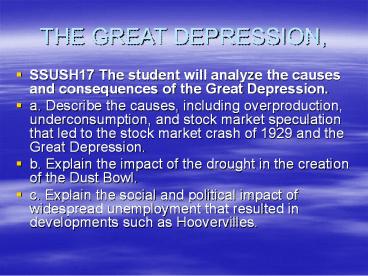THE GREAT DEPRESSION, - PowerPoint PPT Presentation
1 / 24
Title:
THE GREAT DEPRESSION,
Description:
GREAT DEPRESSION The Great Depression was a worldwide economic downturn starting in most places in 1929 and ending at different times in the 1930s or early 1940s ... – PowerPoint PPT presentation
Number of Views:490
Avg rating:3.0/5.0
Title: THE GREAT DEPRESSION,
1
THE GREAT DEPRESSION,
- SSUSH17 The student will analyze the causes and
consequences of the Great Depression. - a. Describe the causes, including overproduction,
underconsumption, and stock market speculation
that led to the stock market crash of 1929 and
the Great Depression. - b. Explain the impact of the drought in the
creation of the Dust Bowl. - c. Explain the social and political impact of
widespread unemployment that resulted in
developments such as Hoovervilles.
2
GREAT DEPRESSION
- The Great Depression was a worldwide economic
downturn starting in most places in 1929 and
ending at different times in the 1930s or early
1940s for different countries. - The Great Depression originated in the United
States. - Starting date, the stock market crash, on October
29, 1929, known as Black Tuesday. - The end of the depression in the U.S.A. is
associated with the onset of the war economy of
World War II, beginning around 1939, 1940
3
CAUSES OF THE GREAT DEPRESSION IN THE USA
- 1. Unequal distribution of wealth
- 2. High Tariffs and war debts
- 3. Superficial (fake) prosperity
- 4. Stock market crash and financial panic
4
1. UNEQUAL DISTRIBUTION OF WEALTH
- 1.RICH RICHER, POOR, POORER
- 2.NOT ALL PEOPLE ENJOYED THE PROSPERITY OF THE
1920S. - 3.NOT ENOUGH MONEY TO BUY THE FLOOD OF GOODS
PRODUCED
5
2. HIGH TARIFFS AND WAR DEBTS
- 1.REDUCED FLOW OF GOODS INTO USA
- 2.DECREASE IN TRADE
- 3.ECONOMIC RETALIATION ABROAD
- 4.NON-PAYMENT OF WAR DEBTS
6
3. SUPERFICIAL (FAKE) PROSPERITY
- 1.OVERPRODUCTION IN INDUSTRY AND AGRICULTURE
- 2.DECLINE IN DEMAND FOR GOODS
- 3.DROUGHT CONDITIONS
7
4. STOCK MARKET CRASH AND FINANCIAL PANIC
- 1.FINANCIAL CRISIS
- 2.CONSUMER CREDIT AND DEBT
- 3.LESS SPENDING
- 4.BANK FAILURES
- 5.BUYING STOCKS ON MARGIN (BUYING OF STOCK AS
DOWN PAYMENT, THE REST ON CREDIT)
8
THE GREAT DEPRESSION
- International trade was deeply affected, as were
personal incomes, tax revenues, prices, and
profits. Cities all around the world were hit
hard, especially those dependent on heavy
industry. Construction was virtually halted in
many countries. Farming and rural areas suffered
as crop prices fell by 40 to 60 percent. Facing
plummeting demand with few alternate sources of
jobs, areas dependent on primary sector
industries such as farming, mining and logging,
suffered the most .
9
GREAT DEPRESSION
- The Great Depression ended at different times in
different countries. The majority of countries
set up relief programs, and most underwent some
sort of political upheaval (change), pushing them
to the left or right. In some states, the
desperate citizens turned toward nationalist
demagogues - the most infamous being Adolf Hitler
- setting the stage for World War II in 1939.
10
IMPACT OF THE GREAT DEPRESSION
- 1.HARDSHIP, SUFFERING ON FAMILY, MEN, WOMEN,
CHILDREN - 2.SHANTYTOWNS, SOUP KITCHENS, BREAD LINES
- 3.BEGINNING OF DUST BOWL, 1933-36
- a.CAUSED BY SEVERE DROUGHTS
- b.FARMERS PLOWED AND EXHAUSTED LAND.
- c.WIND REMOVED TOPSOIL, ESPECIALLY IN OK, KA, TX,
NM, CO - d.MANY MIGRATE TO PACIFIC COAST STATES
- 4.PSYCHOLOGICAL IMPACT-SUICIDES
11
IMPACT
- 5.WIDESPREAD UNEMPLOYMENT
- a.MEN IN THE STREETS, HOMELESSNESS
- b.TRANSIENT (MOVING) POPULATION
- c.NO DIRECT RELIEF (FOOD OR CASH PAYMENTS) FROM
GOVERNMENT - 6.HOOVERVILLES
12
IMPACT
- HOOVERVILLES, popular name for a shanty town
built by homeless men in the depression years.
The term was coined by Charles Michelson,
publicity chief of the Democratic National
Committee.
13
HOOVERVILLES
- These settlements were often formed on empty land
and consisted of jerry-built shacks and tents.
Authorities did not officially recognize these
Hoovervilles and occasionally removed the
occupants for technically trespassing on private
lands, but they were frequently tolerated out of
necessity.
14
HOOVERVILLES
- Most people to building their residences out of
box wood, cardboard, and any scraps of metal they
could find. Some individuals even lived in sewer
mains. - Most unemployed residents of the Hoovervilles
begged for food from those who had housing during
this era. Democrats coined other terms, such as
"Hoover blanket, old newspaper used as
blanketing.
15
(No Transcript)
16
(No Transcript)
17
HERBERT HOOVER
- Herbert Clark Hoover ,1874 1964, was the
thirty-first President of the United
States,19291933.
18
HERBER HOOVER
- By 1932, the Great Depression had spread across
the globe. In the U.S., unemployment had reached
24.9, a drought persisted in the agricultural
heartland, businesses and families defaulted on
record numbers of loans, and more than 5,000
banks had failed. Tens-of-thousands of Americans
found themselves homeless and they began
congregating in the numerous Hoovervilles (also
known as shanty towns or tent cities) that had
begun to appear across the country. The name
'Hooverville' was coined by their residents as a
sign of their disappointment and frustration with
the perceived lack of assistance from the federal
government.
19
(No Transcript)
20
RESULTS OF THE GREAT DEPRESSION
- 1.UNEMPLOYMENT
- 2.RISE OF SHANTYTOWNS
- 3.BANKS FAIL AND SCHOOLS CLOSE.
- 4.WORLD ECONOMIC DOWNTURN
- 5.MORE GOVERNMENT INVOLVEMENT
- 6.PRESIDENCY OF FRANKLIN ROOSEVELT, A DEMOCRAT,
AND THE NEW DEAL, 1932
21
(No Transcript)
22
(No Transcript)
23
(No Transcript)
24
(No Transcript)































